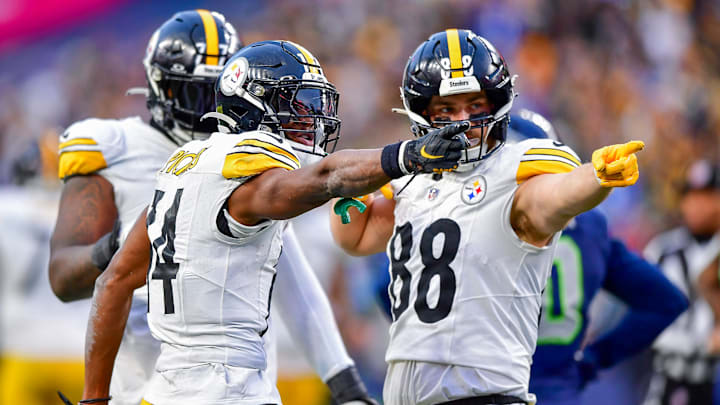I’m what some would call the “Buzzkill of Still Curtain,” as I’ve developed a nasty habit of looking at matters through a pessimistic lens, with my last talking point being one of many to fall victim to it.
A couple of weeks back, I was quite critical of Pittsburgh’s ongoing offseason campaign, to a severity that seemingly no one matched. The takeaways I held such displeasure toward can be found here, and I am not afraid to stress that I still stand by them.
I have since conducted a deeper analysis though, one on a single (yet pivotal) piece of the new-look Steelers that has been so heavily neglected by the masses who claim to praise it, that even I believe we’re failing to give credit when due. The piece in question? The quarterback room, and I don’t mean Kyle Allen.
Let’s recap what’s already been talked about
I’d like to think there’s little elaboration needed for what makes Pittsburgh’s acquisitions at QB—Russell Wilson and Justin Fields—special on the exterior, as ever since headlines broke, the talk of the town has been the pocket change that said acquisitions were achieved with $1.2 million for Wilson and a mid-to-late draft pick for Fields.
Right underneath that, there are the basic observations of both talents, such as the former adding potential to the Steelers passing game and the latter showing promise as a dual threat.
When summarizing those positives, we have the following: Pittsburgh got two quarterbacks at a bargain price, one of which is a decent passer while the other can turn on the jets. Cool? Sure, but telling? Not really.
Think about it—Wilson makes the Steelers air attack better? With how mediocre it’s been, I would like to think so! Then there’s Fields’ rushing ability. Though it’s a trait that should always be welcomed warmly, how much will it bring to the table in the immediate future when he's currently the backup and RBs Najee Harris and Jaylen Warren have proven they can cover the running game well enough by themselves?
In short, these qualities, while fine and dandy, do little to promise us significant growth in the Steel City. However, the same cannot be said for the other ones I’ve recently discovered. And how did I discover them? By merely peeling back one layer, looking not at the quarterbacks obtained, but instead at whom they played alongside.
It’s two players in particular that prove these QBs belong in Pittsburgh
Kicking things off with Wilson, he just spent 2023 sharing the Broncos backfield with Samaje Perine, a running back who’s been an attractive option through the air for a few years now. Last season was easily the most indicative of this though, as he saw bests for single-season receptions and yardage. His numerical total was 50 catches for 455 yards, which equates to just over nine yards a catch.
With Wilson coming from an offense that routinely relied on an RB to put up numbers like those, he appears to be all the better of a fit for Pittsburgh’s, as Jaylen Warren has established himself as a receiving threat also (just had 61 catches for 370 yards).
When it comes to Fields, one of his favorites in Chicago stands out even more—at least to me—as he plays a position that I feel the Steelers have criminally underused in past years: Cole Kmet.
In each of Fields’ three seasons with the Bears, Kmet finished as a top-two target. Can a connection half as strong as that one not be replicated in Pittsburgh with TEs like Pat Freiermuth and Darnell Washington, the former of which is already proven and both of which are just as (if not more) physically dominating than Kmet? Of course, it can.
And I can hear the doubters already: “Sure Austin, these guys just so happened to utilize their weapons preferably, but that was during their times on different teams, under different coaching. How does that equate to them doing the same in an entirely different environment?”
My answer is simple: If the Steelers didn’t see any appeal in how either QB played with whom, then they wouldn’t have signed them, right?
You can disagree, but that would essentially mean that you think the franchise is run so poorly that it signed two big-name talents despite paying zero attention to detail as crucial as how they moved the ball. I, for one, like my answer a lot better. Who’s the buzzkill now?
